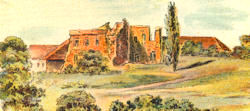Przasnysz Parish History
Original English translation by Georg Schoning with editing by Gerd Klatt.
Source: Die evangelisch-augsburgischen Gemeinden in Polen 1555-1939 by Eduard Kneifel. [The Evangelical-Augsburg (Lutheran) Parishes in Poland, 1555-1939]
Note: The term "ewangelic" translates to "evangelical" in English but in German context, especially in materials written by Kneifel, a Lutheran pastor, it should be thought of as reference to followers of Martin Luther. There was no church in Europe named as the Lutheran church, as is the case in North America. In other contexts you will find "ewangelische-Reformierte", the Reformed Church, "ewanglische-Unierte", the United Church and perhaps others. Other denominations such as Baptists (Baptisten) or Mennonites (Mennoniten) did not, for some reason, get the "ewangelic" descriptor.
Description
- Located about 85 km north of Warsaw.
- In 1814 German Lutheran Colonists settled in Janowka, County of Ciechanow.
- In about 1820 Kicin, Grabowiec, Lipowiec, Rzeszotko, Wola Wodzynska, Halinin and Trzpiał were added to Janowka.
- The Masurian Lutheran villages of Helenowo, Jozefowo, Dąbrowa, etc. were added as well.
- Many farmers immigrated to the Lublin region and to Russia from Kanigowka, Wojtkowa, and other settlements.
- Around 1860 the colonies flourished briefly, but the uprising of 1863-64 not only interrupted their growth but led to larger emigration to Volhynia and after 1890 to America.
- Plans existed as early as 1823 for the founding of a parish in Przasnysz, but the 300 Lutheran families were not prepared to pay 600 zloty annually for the support of a pastor; they rather sought help and support from the government.
- In 1823 the government gave a plot of land and the necessary material for the building of a church and a parsonage for a cost of 6,975 zloty.
- Pastor Lauber of Warsaw dedicated the new church on May 18, 1826.
- The parsonage proved to be too small, and thus was converted to a school and an apartment for church personnel. A larger parsonage was completed in 1862.
- The government began to provide to the parish in 1835 an annual stipend of 1,500 zloty.
- Vikar Emil Lauber was selected in 1835 as the resident pastor in Przasnysz.
- Lauber’s work was strongly opposed from the outset by a considerable number of the members; this opposition continued until an affiliate was formed in Lipiny, County of Ciechanow.
- Conflict between pastor and congregation ensued, forcing Lauber to leave the parish for a lengthy period and reside in a rented residence in another town. He hurried through services and failed to perform his religious duties such as burials, which had to be postponed for up to three weeks. The consistory removed Lauber from Przasnysz when members began to leave the church and join the Catholic parish.
- During the service of Kasimir Lembkes (1858 – 1872) and pastors Karl Doll and Julius Kweiszer, the Baptist movement spread. Kweiszer was helpless in opposing the work of the Baptists and was moved to Wizajny by the consistory. His successor, Ferdinand Robert Haefke, also was ineffective and left the area.
- The pastor position in Przasnysz was vacant from 1881 to 1898, and the parish lacked leadership and spiritual care.
- Under the short assignments of Robert Gundlach and Oskar Ernst, improvement was slow and the lack of cooperation between them and the church leadership exacerbated the bad situation .
- Pastor Ernst dedicated the addition of a sacristy and a tower to the church on November 27, 1903.
- Almost all members were forcibly moved to the interior of Russia during World War I.
Pastors and Teachers
- Emil Lauber 1835 – 1849
- Karl Gustav Manitius 1849 – 1853
- Eugen Albrecht Rosenberg 1853 – 1858
- Kasimir Lembke 1858 – 1872
- Karl Doll 1872 – 1873
- Karl Arthur Krause 1873 – 1874
- Julius Kweiszer 1874 – 1877
- Ferdinand Robert Haefke 1877 – 1881
- Robert Gregor Gundlach 1898 – 1900
- Oskar Ernst 1900 – 1904
Some Statistics
- Founding of the parish - 1835
- Membership: In 1867 - 3117; in 1914 - 2000; in 1923 - 450 (99 families)
- Schools: In 1867 - 12; in 1904 - 7; by 1939 no more remained
- Church services were conducted in Polish.
- In 1923, there were only 3 baptisms, 1 death, 97 Polish communicants, and 97 contributors.
- The 1924 budget was for 400 zloty of which 140 zloty was the pastor's salary.
Villages
(with founding date or date of Germans arriving if known)Janowka about 1814
Kicin about 1820
Grabowiec about 1820
Lipowiec about 1820
Rzeszotko about 1820
Wola Wodzynska about 1829
Halinin about 1820
Trzpiał about 1820
Helenowo
Jozefowo
Dąbrowa


